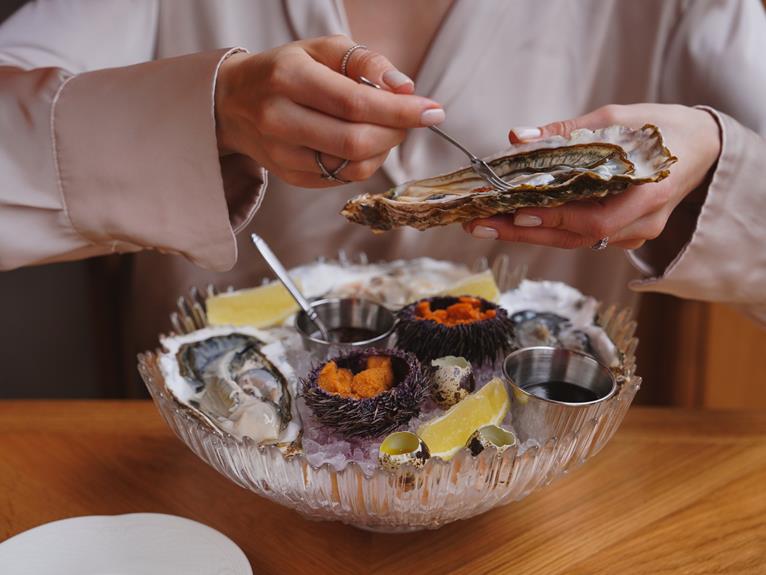Looking for the absolute best sustainable seafood options in the Algarve? Well, look no further because I've got the top 10 choices just for you!
In this guide, I'll be sharing some mouthwatering seafood options that not only taste amazing but also help protect our precious oceans. From grilled sardines to stuffed squid, these dishes are not only delicious but also sourced in a way that ensures the long-term health and sustainability of our marine ecosystems.
So whether you're a seafood enthusiast or simply someone who wants to make a positive impact, join me as we explore the top 10 sustainable seafood options in the Algarve.
Get ready for a seafood feast that's good for you and the environment!
Key Takeaways
- Grilled Sardines, Octopus Rice, Stuffed Squid, and Codfish À Brás are some sustainable seafood options in Algarve.
- Fishing practices such as bottom trawling and pot fishing can lead to habitat destruction and bycatch.
- Overfishing of octopus can disrupt the marine ecosystem.
- Choosing sustainable seafood supports the local economy, reduces the carbon footprint, provides nutritional benefits, and promotes sustainable dining practices.
Grilled Sardines
Grilled sardines are a delectable and sustainable seafood choice in the Algarve, showcasing the region's rich culinary tradition and the abundant waters that make them an environmentally friendly option for seafood lovers like me. Sardines are a popular dish in Portugal and are especially celebrated during summer festivities.
The simplicity of grilling sardines with just salt, embers, and Portuguese olive oil allows the natural flavors of the fish to shine through. Not only do grilled sardines offer a delightful taste of the sea, but they're also a sustainable choice. Sardines are abundant in the waters of the Algarve, making them an excellent option for those who care about the environment.
With their delicious flavor and eco-friendly qualities, grilled sardines are a must-try when visiting the Algarve.
Now, let's move on to another delicious dish, octopus rice.
Octopus Rice
I've always been fascinated by the various cooking techniques used to prepare octopus, such as grilling, boiling, and braising.
However, it's important to consider the environmental impact of octopus fishing and ensure that our seafood choices are sustainable.
Thankfully, there are sustainable seafood certifications, such as the Marine Stewardship Council (MSC) and the Aquaculture Stewardship Council (ASC), that help consumers make informed decisions when it comes to enjoying dishes like Octopus Rice.
Octopus Cooking Techniques
One popular technique for cooking octopus rice in the Algarve involves slow-cooking the octopus in a pot with tomatoes, onions, and garlic before adding it to the rice, allowing the flavors to infuse. This method creates a rich and flavorful base for the rice, ensuring that every bite is packed with delicious taste.
Additionally, grilling the octopus before adding it to the rice is another common technique used in the region. This imparts a smoky flavor to the dish, enhancing the overall taste experience.
Octopus rice in the Algarve is often seasoned with local herbs and spices, further enhancing the natural flavors of the octopus and creating a truly aromatic dish. The combination of slow-cooking, grilling, and seasoning techniques results in a mouthwatering octopus rice dish that's sure to please any seafood lover.
Moving on to the environmental impact of octopus fishing…
Environmental Impact of Octopus Fishing
Octopus fishing for the purpose of creating octopus rice has a significant environmental impact. The methods used in octopus fishing, such as bottom trawling and pot fishing, can result in habitat destruction and bycatch of non-target species. These practices can harm the seafloor and other marine organisms.
Overfishing of octopus can disrupt the marine ecosystem, leading to imbalances in the food chain and affecting the population dynamics of other species. To mitigate the negative environmental effects, sustainable octopus fishing practices should be adopted. Selective pot fishing and the use of escape panels can help minimize bycatch and reduce the damage to the seafloor.
Sustainable Seafood Certifications
When exploring sustainable seafood options in Algarve, it's important to consider the availability of reliable certifications. These certifications provide assurance that the seafood you're consuming has been sourced in an environmentally responsible and sustainable manner.
Here are four sustainable seafood certifications to look out for when enjoying octopus rice in Tavira and Santa Luzia:
- Marine Stewardship Council (MSC): The MSC certification ensures that the octopus used in the rice dish comes from a fishery that meets strict sustainability standards, including the use of sustainable fishing practices and the protection of marine habitats.
- Aquaculture Stewardship Council (ASC): This certification guarantees that the octopus has been farmed in a responsible and sustainable manner, minimizing environmental impacts and promoting animal welfare.
- Friend of the Sea (FOS): FOS certification verifies that the octopus has been sourced from fisheries that comply with sustainable fishing practices and have a minimal impact on the marine ecosystem.
- Global Aquaculture Alliance (GAA): The GAA certification ensures that the octopus has been produced in aquaculture facilities that prioritize environmental sustainability, social responsibility, and food safety.
Sea Bass With Vegetables
Sea bass with vegetables is a healthy alternative to cod, providing a delicious seafood recipe that's both sustainable and nutritious.
Sea bass is recognized for its sustainability, making it an eco-friendly choice for seafood lovers.
When paired with fresh, locally sourced vegetables, this dish not only satisfies the taste buds but also promotes a balanced and sustainable diet.
Healthy Alternative to Cod
As a sustainable and nutritious option, sea bass with vegetables offers a healthy alternative to cod in Algarve. Sea bass, recognized by its silver skin and firm white meat, is a versatile and sustainable choice that can be paired with a variety of vegetables for a nutritious and delicious meal. Here are four reasons why sea bass with vegetables is a great choice:
- Health benefits: Sea bass is a good source of protein and omega-3 fatty acids, which are essential for heart health and brain function.
- Versatile cooking options: Sea bass can be cooked in various ways, such as grilling or baking, allowing for a range of culinary creativity while still maintaining its health benefits.
- Fresh and local ingredients: Algarve offers a variety of restaurants that serve sea bass, ensuring that the dish is made with fresh, locally sourced ingredients, contributing to sustainable dining practices.
- Pairing with vegetables: Sea bass pairs well with a variety of vegetables, such as roasted peppers, sautéed spinach, or grilled asparagus, adding an extra dose of vitamins, minerals, and fiber to the meal.
Sustainability of Sea Bass
To delve into the sustainability of sea bass (sea bass with vegetables), let's explore its impact on the environment and its role in promoting sustainable dining practices in Algarve.
Sea bass is considered one of the top sustainable seafood options in Algarve. Its worldwide popularity is due to its firm white meat and silver skin.
From an environmental perspective, sea bass farming practices have evolved over the years to minimize negative impacts on the ecosystem. Sustainable farming techniques include reducing the use of antibiotics, improving feed efficiency, and implementing responsible waste management systems.
By choosing sea bass as a sustainable seafood option, consumers can support the local fishing industry while also enjoying a delicious and environmentally friendly meal.
Sea bass with vegetables isn't only a healthy choice, but it also contributes to the overall sustainability of dining options in Algarve.
Delicious Seafood Recipe
For this delicious seafood recipe, I recommend trying a mouthwatering and sustainable option: sea bass with vegetables. Sea bass is a popular sustainable seafood choice in the Algarve region, known for its firm white meat that's perfect for grilling or baking in salt. When preparing sea bass with vegetables, there are endless possibilities to create a flavorful and healthy dish.
Here are four ideas to get you started:
- Roasted peppers, zucchini, and tomatoes: These colorful vegetables add a burst of flavor and provide essential nutrients.
- Seasonal medley of asparagus, broccoli, and carrots: Not only does this combination result in a vibrant plate, but it also offers a variety of vitamins and minerals.
- Mediterranean flavors with olives, capers, and herbs: These ingredients bring a unique taste profile that complements sea bass beautifully.
- Citrus-based sauce or a light drizzle of olive oil: These additions enhance the natural flavors of the fish and vegetables without overpowering them.
Tuna Tartare
I often enjoy preparing Tuna Tartare, a sustainable and delectable choice, using the top 10 sustainable seafood options in Algarve. Tuna (Atum) is known for its muscular meat and delicious taste when grilled, making it a perfect choice for this dish. However, there are other sustainable seafood options in the Algarve that can be used to create a unique twist on Tuna Tartare. Muxama, for example, is a specialty in Olhão where dried and salted tuna loins are made, offering a flavorful and sustainable alternative. Swordfish (Espadarte) is another option, caught far from the Algarve coastline, providing a sustainable and tasty option for Tuna Tartare enthusiasts. John Dory (Peixe Galo) and Turbot (Pregado) are also excellent alternatives, offering their own unique flavors and sustainability profiles.
To help you understand the different sustainable seafood options for Tuna Tartare in the Algarve, I have created a table below:
| Seafood Option | Sustainability Profile | Flavor Profile |
|---|---|---|
| Tuna (Atum) | Sustainable | Muscular meat, delicious when grilled |
| Muxama | Sustainable | Dried and salted, unique twist, flavorful |
| Swordfish (Espadarte) | Sustainable | Far from the Algarve coastline, delicious |
| John Dory (Peixe Galo) | Sustainable | Unique appearance, tiny white fillets, versatile |
| Turbot (Pregado) | Sustainable | Rare, found only in European waters, gourmet |
Shrimp Ceviche
Shrimp sustainability ratings play a crucial role in determining the best shrimp ceviche options in Algarve. By considering factors such as fishing methods, stock levels, and ecosystem impacts, we can identify the most sustainable choices.
This data-driven approach ensures that we can enjoy delicious shrimp ceviche while supporting the conservation of Algarve's coastal waters.
Shrimp Sustainability Rating
As a seafood enthusiast in Algarve, it's important to consider the sustainability rating of the shrimp used in shrimp ceviche. To make an informed choice, here are four key factors to consider when assessing the sustainability of shrimp:
- Fishing Method: Opt for shrimp that are harvested using sustainable fishing methods, such as trap or pot fishing, which minimize bycatch and ecosystem damage.
- Stock Status: Look for shrimp that come from well-managed fisheries with healthy stock levels. Avoid shrimp from overfished populations.
- Certifications: Choose shrimp that carry reputable certifications, such as the Marine Stewardship Council (MSC) or the Aquaculture Stewardship Council (ASC), which ensure responsible fishing practices.
- Environmental Impact: Consider the overall environmental impact of shrimp farming practices, such as water pollution and habitat destruction. Look for shrimp sourced from farms that prioritize sustainability and minimize their ecological footprint.
Best Shrimp Ceviche?
Continuing with our exploration of sustainable seafood options in Algarve, let's now delve into the delectable world of shrimp ceviche.
When it comes to finding the best shrimp ceviche in the region, there are several seafood restaurants in Algarve that are worth a visit.
One such establishment is Pearl Food Trailer in Lagos, which is known for its incredible oysters and cheese boards.
Another option is Cais Ao Mar Algarve in Albufeira, where you can indulge in a wide variety of seafood dishes, including the must-try shrimp ceviche.
If you're in Vilamoura, The Fishermans Shack Restaurante is a great choice, offering a welcoming and authentic dining experience with their delicious prawn ceviche.
No matter which seafood restaurant you choose, Algarve is sure to satisfy your cravings for the best shrimp ceviche.
Monkfish Stew
Although I'm not a fan of seafood, I must admit that Monkfish Stew is a delectable dish. Monkfish, known for its large size and firm white flesh, is the star of this flavorful stew.
Here are four reasons why Monkfish Stew is a must-try dish:
- Rich and hearty: Monkfish stew is a satisfying seafood dish that's packed with rich flavors. The combination of tomatoes, onions, garlic, and aromatic herbs and spices creates a robust and savory broth.
- Versatile and absorbent: Monkfish has a unique ability to absorb flavors, making it the perfect ingredient for a stew. It takes on the taste of the ingredients it's cooked with, resulting in a harmonious blend of flavors.
- Sustainable choice: Monkfish is a sustainable seafood option in Algarve. Its population is well-managed, ensuring that it's harvested responsibly and in a way that supports the long-term health of the species.
- Delicate and firm texture: The firm texture of monkfish adds a delightful bite to the stew. It remains tender and moist when cooked, making each spoonful a pleasure to savor.
As we move on to the next dish, let's explore the exquisite flavors of clams in garlic sauce.
Clams in Garlic Sauce
I love indulging in the flavors of the Algarve by savoring clams in garlic sauce. These delectable clams, known as Amêijoas, are found along the sandy bottoms and mud of the Algarve coast. Cooked in the popular Bulhão Pato-style, they're prepared with garlic and coriander, creating a burst of flavors that seafood enthusiasts will truly appreciate.
Not only are clams in garlic sauce a culinary delight, but they're also a sustainable seafood option. The harvesting of clams in the Algarve follows traditional and sustainable practices, ensuring the availability of this delicious dish for years to come. By choosing clams in garlic sauce, you're supporting the region's commitment to sustainable seafood choices and preserving the rich culinary heritage of the Algarve.
Now that we've explored the mouthwatering flavors of clams in garlic sauce, let's move on to another sustainable seafood option: grilled mackerel.
Grilled Mackerel
Grilling mackerel is a sustainable seafood option that offers a delectable taste and supports environmentally conscious fishing practices in Algarve. Here are four reasons why grilled mackerel is a must-try sustainable seafood option:
- Nutritional Benefits: Grilled mackerel is packed with essential nutrients like omega-3 fatty acids, protein, and vitamins. These nutrients contribute to heart health, brain function, and overall well-being.
- Low Environmental Impact: Mackerel is a fast-growing species that reproduces quickly, making it a sustainable choice. Additionally, grilling mackerel reduces the need for harmful fishing practices, such as bottom trawling, which can damage marine ecosystems.
- Local Sourcing: Algarve is known for its rich marine biodiversity, and grilling mackerel allows you to enjoy a locally sourced dish. Supporting local fishermen who practice sustainable fishing methods helps preserve the region's natural resources.
- Flavorful Delight: Grilled mackerel offers a unique flavor profile with its rich, oily flesh and crispy skin. Its distinct taste pairs well with various herbs and spices, allowing you to create a mouthwatering dish that will tantalize your taste buds.
Indulge in the deliciousness of grilled mackerel while knowing you're making an environmentally conscious choice that supports sustainable fishing practices in Algarve.
Stuffed Squid
One sustainable seafood option that I absolutely love in Algarve is enjoying stuffed squid. Stuffed squid is a delicious and eco-friendly dish that showcases the region's sustainable culinary offerings. Squid is a versatile and sustainable seafood choice that can be stuffed with a variety of fillings, such as local vegetables, herbs, and grains. By using locally sourced ingredients, stuffed squid not only supports the local economy but also reduces the carbon footprint associated with transportation. When it comes to sustainability, it is important to make conscious choices about the food we consume. By opting for stuffed squid made with sustainable ingredients, we can indulge in a flavorful and guilt-free seafood dish that is good for both our taste buds and the environment.
| Pros | Cons |
|---|---|
| Sustainable seafood | Requires skill |
| Supports local economy | Time-consuming |
| Reduces carbon footprint | May be expensive |
| Healthy and nutritious | Limited availability |
| Versatile and flavorful |
Codfish À Brás
Codfish À Brás is a sustainable and delicious seafood dish commonly enjoyed in the Algarve region. Here are four reasons why this dish is a great choice for seafood lovers:
- Sustainable sourcing: The availability of cod in the Algarve region ensures that the fish used in Codfish À Brás is sourced sustainably. This means that the cod populations are managed responsibly, helping to preserve the ecosystem and support the livelihoods of local fishermen.
- Locally sourced ingredients: Codfish À Brás incorporates locally sourced eggs and potatoes, reducing its carbon footprint. By choosing this dish, you're supporting local farmers and reducing the environmental impact of transportation.
- Nutritional benefits: Codfish is a good source of lean protein, omega-3 fatty acids, and vitamins. These nutrients contribute to heart health, brain function, and overall well-being.
- Versatility: Codfish À Brás can be enjoyed on its own or served with seafood rice, adding even more flavor and variety to your meal.
Frequently Asked Questions
Which City in Portugal Has Best Seafood?
In my opinion, the best city in Portugal for seafood is Albufeira. They offer a wide variety of sustainable options and are known for their delicious percebes, lingueirãos, crabs, and oysters.
What Fish Is Algarve Famous For?
The Algarve is famous for its diverse and delicious seafood options. From tuna and sea bream to sardines and octopus, there is something for everyone. But one fish that stands out is the swordfish, with its impressive size and juicy white flesh.
What Fish Is in Season Algarve?
Fish availability in the Algarve varies depending on the season. Some popular options include tuna, sea bream, John Dory, sardines, and razor clams. It's important to choose sustainable seafood options to protect the marine ecosystem.
Does Portugal Have a Lot of Seafood?
Oh boy, let me tell you, Portugal has seafood for days! From tuna to swordfish, lobster to clams, we've got it all. Our coastline is a seafood lover's dream come true. Trust me, you won't be disappointed.
Conclusion
In conclusion, the Algarve region in Portugal offers a diverse array of sustainable seafood options that aren't only delicious but also support the long-term health of marine ecosystems.
From grilled sardines and octopus rice to sea bass with vegetables and tuna tartare, there's a wide variety of choices to satisfy your taste buds.
By choosing these sustainable options, you can enjoy a guilt-free dining experience that promotes environmental sustainability.



